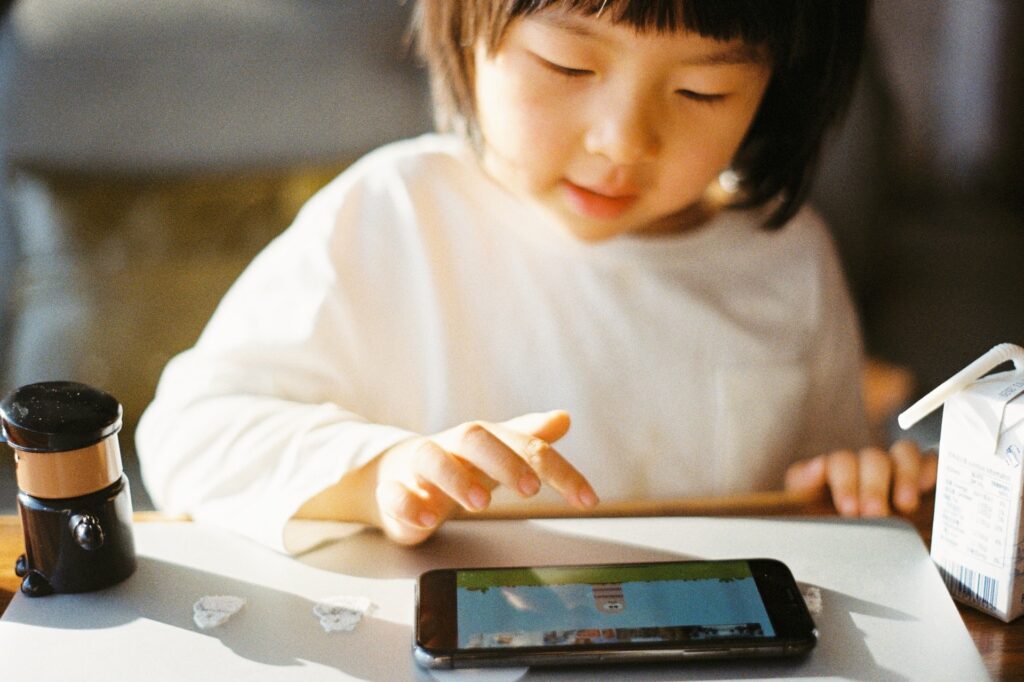
“Isn’t this cute, Daddy?”
Her voice startled me out of my accidental slumber. I glanced up, realizing my daughter had blown past her allotted screen time.
I rubbed my eyes, and glanced at the screen. Some sort of claymation creatures were dancing about. “What is this? Turn it off!” I stammered, grasping for the rogue device, swiping YouTube away. “What happened to the yoga video?”
A shrug. We shouldn’t have bought a tablet for our 3-year-old.
That had already become clear: What started out as a hoped-for distraction on long summer car rides became a source of carsickness—and car cleaning. Unable to perform its intended function, the tablet quickly became a source of digital temptation for a little girl who had been stuck at home for far too many months.
RELATED: I Disconnected From Social Media for One Year. This Is What I Learned
Of course, that’s no excuse for a lack of digital oversight.
I was reminded of that yet again, just a few mornings ago, as I listened to a daily news podcast and fumbled with the coffee machine. There was a certain degree of guilt that washed over me as I heard the hosts analyzing the recent “Facebook Files” report by The Wall Street Journal—particularly the harm done to young people’s sense of self and self-worth through an overconsumption of beautifully-curated Instagram feeds. My wife and I are raising two daughters.
The reporting led me to a rather obvious truth: What we all thought was dangerous about the digital world is in fact dangerous.
Instagram is toxic. Facebook makes us angry. Powerful people are treated differently on social platforms. And the tech wizards behind the curtain knew it all along.
Of course, of course, of course.
For me, none of this is surprising because all of it mirrors my own experience of social media. Reflecting on how I relate to and through social media, I can’t help but note my own jealousy, insecurity, and anger as I scroll through feed after feed. And this isn’t limited to only Facebook and Instagram.
I know the emotions I hope to prick in my own viewers, too, when I post something on my channels: Look at my cute kids, my great accomplishments, my amazing thoughts. Not always, but often enough, and it takes real personal discernment to disentangle the ego-boosting content from the stuff that might actually help someone, somewhere.
Is this content for the common good or my own good?
If I struggle with the unrelenting storm that is responsible social media use, how can I expect my 3-year-old to be able to navigate these treacherous waters—even in such a limited fashion as watching princess videos on YouTube?
Social media and the digital world it enables are—for better but likely for worse—unavoidable facets of our lives. And I will only get older and less tech-savvy as the years go by.
Like most parents, I grapple with how to balance a desire to shield my children from this digital world for as long as possible with a desire to raise children that are media literate. And the WSJ’s reminder of the toxicity of Instagram—particularly for young women—only ups the ante.
Here’s the difficult truth: We can’t shield ourselves or our loved ones from these digital dangers. And social platforms will only continue to multiply, expand their reach and integrate their offerings. My meager parenting tricks have no hope of staying ahead of the curve.
RELATED: How to Practice Responsible Media Consumption
I used to teach a course on social media and strategic communications at a local university. Students took the class to learn how to run social media campaigns, but I spent one-third of the class teaching theoretical frameworks with which to examine social media and its impacts on relationships, society, self-esteem, public discourse and more, and another third gaming out the impacts of social media on democracy, peace, and the exchange of information.
Students were frequently frustrated. They thought they were getting a course on which Instagram posts perform the best and how to run ads on Facebook. While we did cover topics such as those, I reminded my students again and again: Interfaces and trends change rapidly; what we’re doing here is learning how to approach this brave new(ish) world with a discerning eye.
A discerning eye means taking time to track down sources of information and to think critically about who is sharing content—and why. A discerning eye means thinking through the implications of what we consume and what we share and the ripples our own overeager tweeting thumbs might send out into our friends and families. A discerning eye means carefully considering how we feel as we scroll through feed after feed. Are we better for the time spent? Or, are we more distracted, depressed and demoralized?
All this and then some for parents. My wife and I do our best to monitor screen time and double check privacy settings. But at the end of the day, I hope we equip our daughters with the emotional, mental and moral compasses they’ll need to navigate media.
But it’s not just children that need an anchor in the rough waters of the digital world; we all need one. And it’s a mantra as simple as this, a mantra that resists the temptation to jealousy, anger and self-doubt that runs rampant across social channels:
You are enough. You are good. There is so much more to the world than what’s behind this screen.